Outrage Of Iran Sunni Leader Over Prisoner' Executions
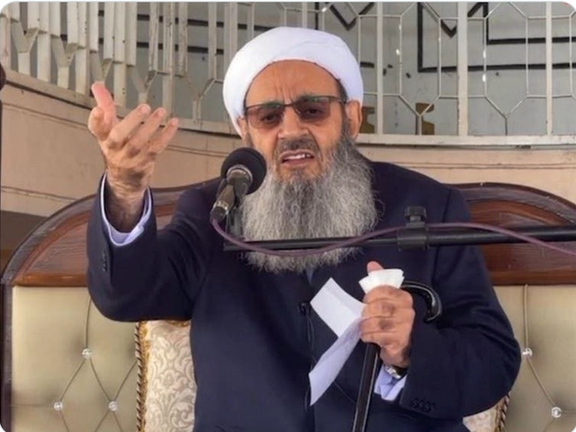
The execution by hanging of three political prisoners in Iran on Friday morning has been condemned by a leading Sunni cleric.

The execution by hanging of three political prisoners in Iran on Friday morning has been condemned by a leading Sunni cleric.
Mowlavi Abdolhamid Abdolhamid said Majid Kazemi, Saeed Yaghoubi and Saleh Mirhashemi had been sentenced to death after "forced confessions.".
Condemning the Shia theocracy in the harshest terms for the killings, he said: “These executions do not exist in Islam, and the world should not view them as results of the religion.”
Speaking in his Friday prayer sermon shortly after the men were hanged, Iran’s most senior Sunni cleric said that torturing the accused to obtain confessions has become a "common thing" in the Islamic Republic.
The three prisoners were convicted over the death of two IRGC’s Basij militia members and a police officer in protests of November last year, in what Persian media have dubbed the ‘Esfahan (Isfahan) House’ case. Human rights campaigners say the prisoners were tortured into confessions, and there is no reliable evidence against them.
Abdolhamid said: "On the one hand, the judicial officials said that they confessed to murder, and on the other hand, they sent a message from inside the prison saying that the confessions were made under duress.
“All the people of Iran and the world had called for stopping the executions. Now the public trust has been damaged, and people have lost their trust in the confessions."
In a defiant message to the authorities, he said: "Be sure that the nation cannot be stopped by executions."
Recent nationwide protests posed the biggest internal challenge to the Islamic Republic since its establishment in 1979. So far, around 500 civilians have been killed by security forces and at least 20,000 arrested. While many have been released, around 1,500 face criminal charges, and at least 80 detainees face the death sentence.
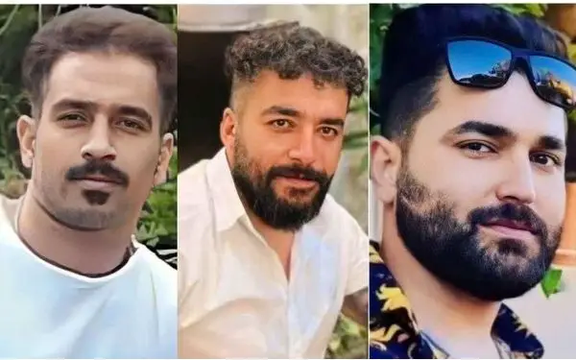
Despite global outcry, Iran’s regime on Friday morning executed three political prisoners who were arrested during last year's protests and framed for murder.
Majid Kazemi, Saeed Yaghoubi and Saleh Mirhashemi were convicted over the death of two IRGC’s Basij militia members and a police officer in protests of November last year, in what Persian media have dubbed the ‘Esfahan (Isfahan) House’ case.
The judiciary announced their execution in a statement on Twitter Friday morning, bringing to at least seven the number of protesters hanged since the beginning of the nationwide protests since September 2022 following the death in custody of 22-year-old Mahsa Amini.
The three were handed down the death sentence in a trial condemned as a travesty of justice by human rights campaigners, who say the prisoners were tortured into confessions, and there is no reliable evidence against them.
A photo of Saleh Mirhashmi's father went viral on Thursday holding a banner that reads, "My son is innocent. He didn't have any weapon."
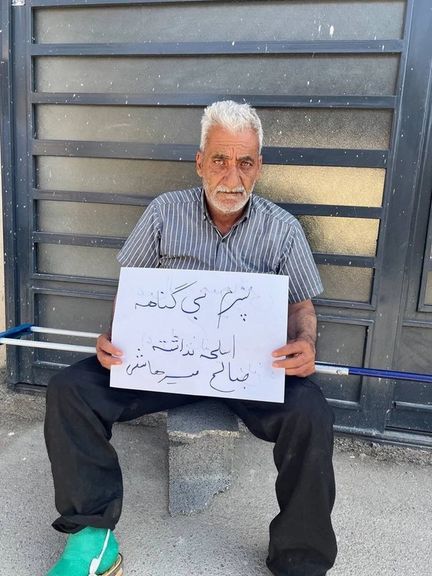
The three wrote from jail on Wednesday, urging the people to stop their execution. Describing themselves as "children of Iran" in the letter, the three prisoners said: "Hello. We ask our dear fellow citizens not to let them kill us. We need your help. We need your support."
Following the news of the executions, videos are emerging on social media of people expressing anger and chanting slogans. There are dozens of social media users who are calling for protest rallies against the executions.
During the past several days, a large number of foreign officials and human rights activists had called on the Islamic Republic to stop the executions.
During a news briefing on Thursday, Vedant Patel, the Principal Deputy Spokesperson of US State Department, joined the international community in calling on the regime not to carry out the executions, saying, "We are aware that Iranian authorities may imminently execute Majid Kazemi and Saleh Mirhashemi and Saeed Yaghoubi in connection with their participation in protests in Iran.”
“The execution of these men, after what have been widely regarded as sham trials, would be an affront to human rights and basic dignity in Iran and everywhere,” he said, noting that “It is clear from this episode that the Iranian regime has learned nothing from the protests that began with another death, the death of Masa Amini in September of last year.”
“We once again urge Iran's leadership to stop the killing, stop the sham trials, and respect people's human rights."
Amnesty International also on Wednesday slammed their trial and sentencing saying it was “shocking”.
Diana Eltahawy, Amnesty International’s Deputy Director for the Middle East and North Africa, said: “The shocking manner in which the trial and sentencing of these protesters was fast-tracked through Iran’s judicial system amid the use of torture-tainted ‘confessions’, serious procedural flaws and a lack of evidence is another example of the Iranian authorities’ brazen disregard for the rights to life and fair trial.”
Amnesty’s statement also referred to Majid Kazemi’s audio recording from prison in which he said he was forced to make false self-incriminating statements after interrogators beat him, gave him electric shocks, subjected him to mock executions, threatened to rape him, execute his brothers and harass his parents.
On Sunday night and again on Wednesday night, people gathered outside Esfahan Central Prison hoping to stop the hangings.
Opposition activists say the death penalty was used against the three men as an intimidation tactic to stop further protests.
Iranian expatriate communities plan demonstrations against the executions in cities worldwide on Saturday, May 20.
Recent nationwide protests posed the biggest internal challenge to the Islamic Republic since its establishment in 1979.
So far, around 500 civilians have been killed by security forces and at least 20,000 arrested. While many have been released, around 1,500 face criminal charges, and at least 80 detainees face the death sentence.
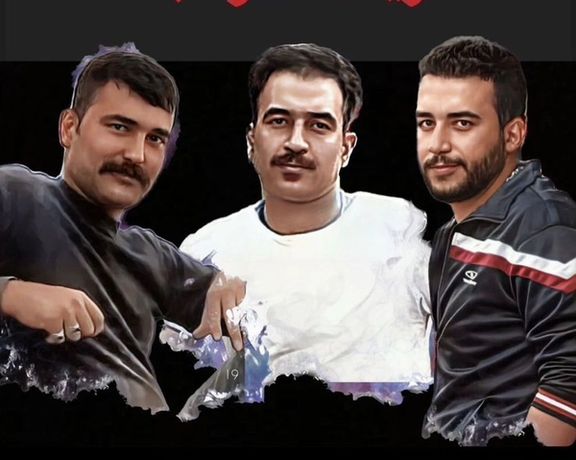
Three death row detained Iranian protesters said in a phone call from the city of Esfahan (Isfahan) prison that they are still alive.
Majid Kazemi, Saleh Mirhashemi, and Saeed Yaqoubi, who are awaiting the death sentence handed down in a trial condemned as a travesty of justice by human rights campaigners, made a phone call to their families Wednesday night, cousin of Kazemi, Mohammad Hashemi said in a tweet.
He also thanked the people who have twice gathered in front of the prison to stop the execution of the three protesters.
The three inmates were convicted over the death of two IRGC’s Basij militia members and a police officer in protests in November last year, in what Persian media have dubbed the ‘Isfahan House’ case.
On Wednesday evening, protesters in cars gathered outside the jail in Esfahan in an attempt to stop the execution of three political prisoners. Security forces’ gunfire was heard around the jail during the protest.
Amnesty International also on Wednesday slammed their trial and sentencing saying it was “shocking”.
Diana Eltahawy, Amnesty International’s Deputy Director for the Middle East and North Africa, said: “The shocking manner in which the trial and sentencing of these protesters was fast-tracked through Iran’s judicial system amid the use of torture-tainted ‘confessions’, serious procedural flaws and a lack of evidence is another example of the Iranian authorities’ brazen disregard for the rights to life and fair trial.”
Amnesty’s statement also referred to Majid Kazemi’s audio recording from prison in which he said he was forced to make false self-incriminating statements after interrogators beat him, gave him electric shocks, subjected him to mock executions, threatened to rape him, execute his brothers and harass his parents.

A month after the official visit of Iran's exiled Prince Reza Pahlavi to Israel, the country’s intelligence minister met him once again in Washington.
Gila Gamliel, who hosted Reza Pahlavi and his wife during their five-day trip to Israel, tweeted on Wednesday that she had a "successful meeting" with the Iranian exiled prince, and two human rights activists as well as the president of the Israel Allies Foundation.
"The bloodthirsty policy of the Ayatollahs' regime, which hurts the people of Iran and the world, should mobilize the international community," she added.
She called Pahlavi's visit to her country "historic" and "the beginning of a new path towards the resumption of friendship between the nations of Israel and Iran," emphasizing that she will continue to meet and negotiate with the Iranian opposition leader in the future.
Activists Benjamin F. Chavis and Tish K. Basil, as well as President of the Israel Allies Foundation Josh Reinstein also attended the meeting between Pahlavi and Gamliel.
“Great to meet with a champion of freedom and the greatest hope for peace between Israel and Iran Reza Pahlavi,” wrote Reinstein in a tweet.
The Israel Allies Foundation was established 16 years ago in the United States and its headquarter is in Jerusalem.
Based on Christian beliefs and Judeo-Christian values it tries to support the existence and strengthening of Israel and to educate and empower legislators in countries around the world.
This foundation organizes tours to familiarize foreign politicians with the state of Israel. Israeli leftist groups criticize some of the actions of the foundation.
It seems that the Israeli government under the leadership of Benjamin Netanyahu, has assigned Gamliel to continue contacts with Reza Pahlavi.
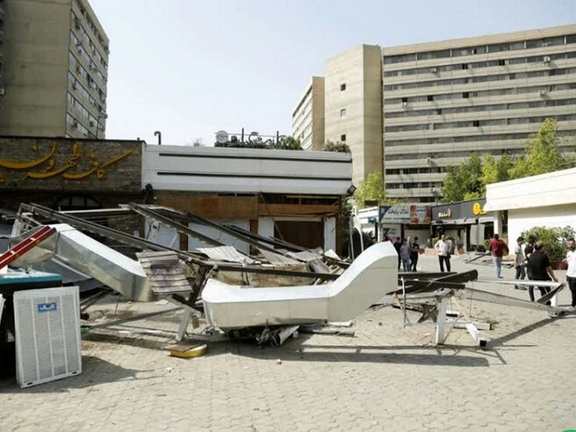
The municipality demolished the outdoor space of several cafes in Tehran’s defiant Ekbatan district, but residents are helping them to clean up and resume business.
Municipality workers supported by riot police on motorbikes, masked security agents and Basij militia began demolishing the outdoor seating spaces of the cafes that have no inside seating at five in the morning on Sunday for what the district mayor, Ehsan Sharifi, said was “unlicensed use of the outside space”.
The neighborhood was an epicenter of protests ignited by the death of Mahsa Amini, the 22-year-old woman who was fatally injured in September 2022 while in police custody following her arrest for not wearing her headscarf “properly.”
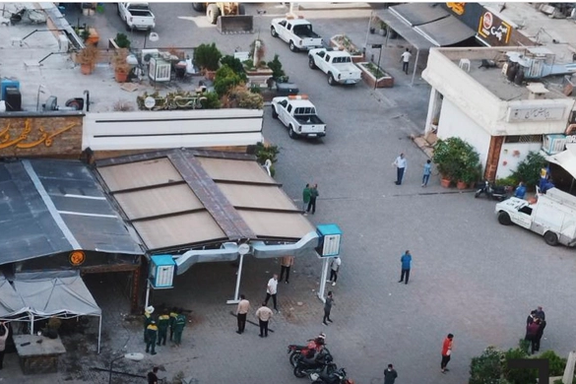
The Basij militia of the Revolutionary Guards (IRGC) has four bases within the five square kilometer complex which has 15,500 apartments and a population of around 45,000. The neighborhood is very popular with professionals, artists and other educated groups with a sense of community unmatched elsewhere in the city.
“They ransacked everything outside the little cafes. Some of these cafes like Godar and Tehroun have been here for years. It was because of hijab but they claim the residents had complained about these businesses,” a young man from Ekbatan told Iran International.
“Do you think they were here to arrest the leader of a human trafficking band? Or that they had found a drug kitchen? Or to arrest an Interpol wanted criminal? Did they find bombs?” tweeted Shahrak Ekbatan, the neighborhood's popular twitter account after the incident.
“No! … They demolished the cafes for spreading ‘corruption and immorality”. Why? Because they are afraid of the people of Ekbatan and their solidarity,” the tweet said.
The admin of the account who wanted to be quoted by the name Aida told Iran International that demolition of the cafes has created a greater sense of solidarity among the residents. “People immediately came to help clean up the mess they left behind and are buying more takeaway at these places to support them.
Residents have dubbed their neighborhood as “The United States of Ekbatan” and “Autonomous States of Ekbatan”.
“This neighborhood does not obey the laws of the Islamic Republic. Enjoy your day!” a graffiti on the wall of one of the blocks, covered in anti-regime slogans, declared recently.
For over three decades Ekbatanis, as they like to call themselves, have hosted one of Tehran’s biggest Charshanbe Suri bonfire night festivals in late March. The police and the Basij militia, who consider the festival a pagan tradition, always cracked down on the merry-making boys and girls, who often flouted the hijab rules too, playing loud music and dancing in the leafy spaces between the buildings.
Ekbatan was also famous for its nightly anti-regime “window chanting” during last year’s protests. Residents have been chanting again from their windows since Monday after rumors emerged that three protesters were at imminent risk of execution in Isfahan.
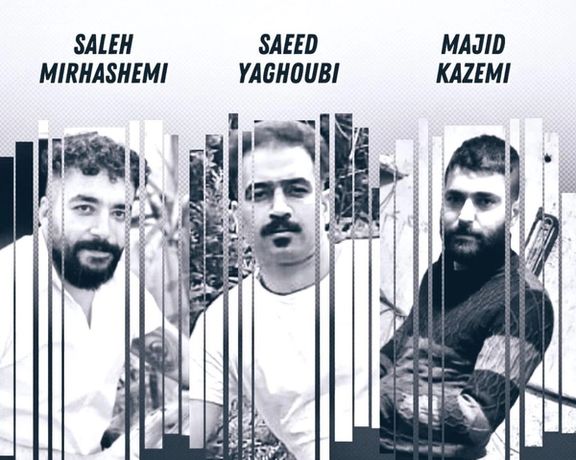
Protestors in cars have gathered outside the jail in Esfahan (Isfahan) in an attempt to stop the execution of three political prisoners.
The demonstrators drove to the prison in central Iran to protest Wednesday night. Majid Kazemi, Saleh Mirhashemi, and Saeed Yaqoubi are being held in Esfahan, awaiting the death sentence handed down in a trial condemned as a travesty of justice by human rights campaigners.
They were convicted over the death of two IRGC’s Basij militia members and a police officer in protests of November last year, in what Persian media have dubbed the ‘Isfahan House’ case.
Security forces’ gunfire was heard around the jail during the protest.
The three political prisoners wrote from jail on Wednesday urging the people to stop their execution.
Describing themselves as "children of Iran" in the letter, the three prisoners said: "Hello. We ask our dear fellow citizens not to let them kill us. We need your help. We need your support."
On Sunday night, demonstrators had gathered outside the prison hoping to stop the feared hangings.
Opposition activists say the death penalty is being used against the Isfahan House three as an intimidation tactic to stop further protests.
Campaigners say the prisoners were tortured into confessions, and there is no reliable evidence against them.
Iranian expatriate communities plan demonstrations against the executions in cities worldwide on Saturday, May 20.